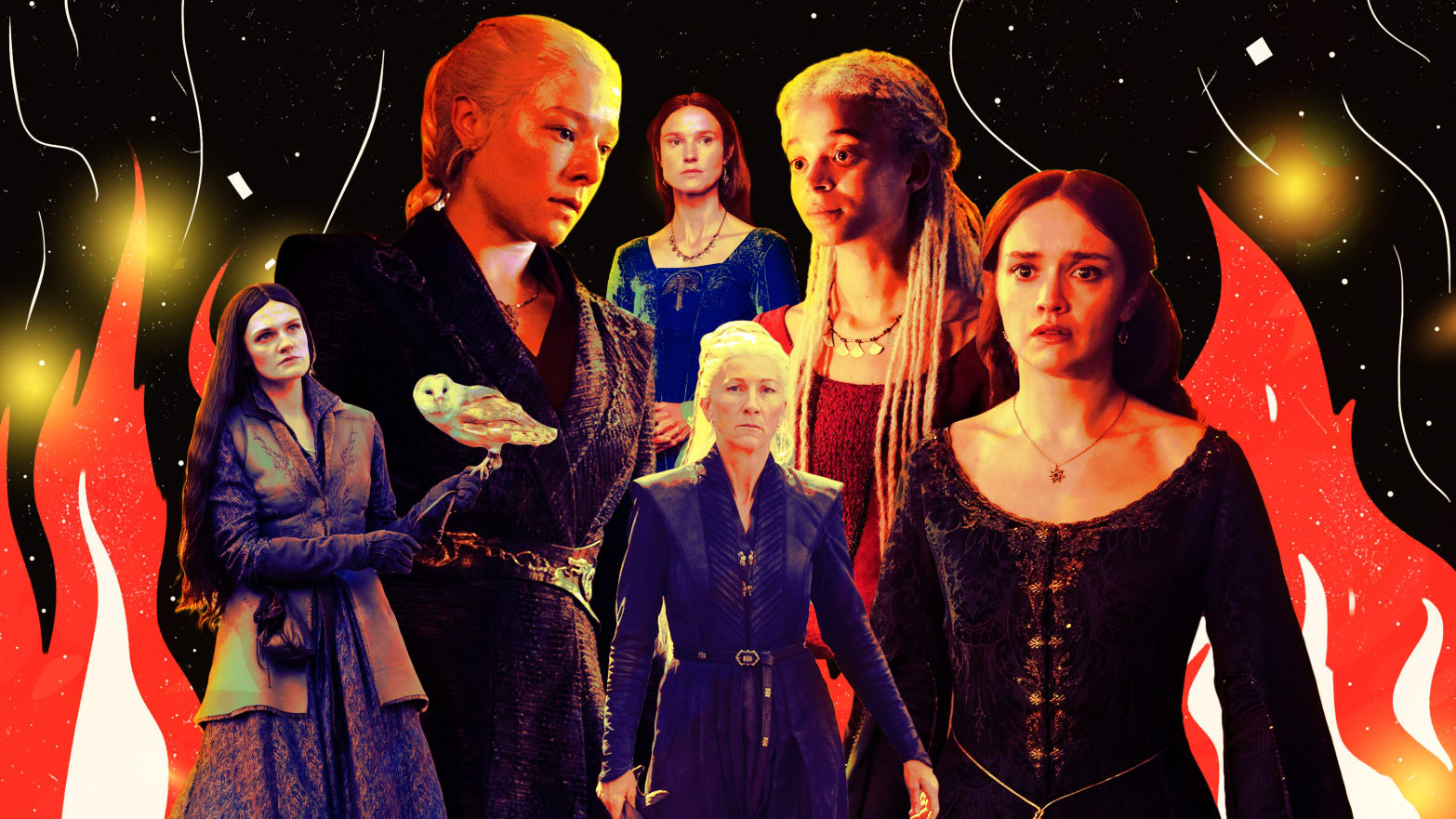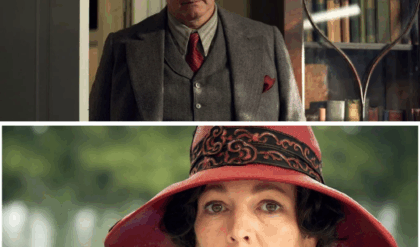The most recent episode of HBO’s “House of the Dragon” gives us hope, but, unlike “Game of Thrones,” the series borders on misogyny in its resistance to violent women.
I remember the exact moment Game of Thrones sucked me in. In Season 1, Episode 4, Catelyn Stark, played by Michelle Fairley, stood in a tavern surrounded by allies of House Stark. After inadvertently pushing these houses to re-pledge their allegiance to House Stark, she commands them to apprehend Tyrion Lannister. The harsh sounds of unsheathing swords fill the room, and Caetlyn stands tall among men.
This small act of power was captivating, asserting that Catelyn, a woman who despite the environment she lived in, was not afraid to resort to violence if it meant protecting what she held dear. This scene is only eclipsed by the actions of Daenerys Targaryen (played by Emilia Clarke), freeing the Unsullied Army while ordering the brutal and very much deserved deaths of the slavers and their accomplices.
We were not starved for more instances of powerful heroines and antagonists throughout the series. Viewers watched as these women, even if bound by the constraints of the patriarchy, still managed to control their narratives and step into their power as the show progressed. These women were not afraid to use violence to fight for themselves and what they believed in.
They chose violence. Women were not afraid of bloodshed.
The same cannot be said in HBO’s House of the Dragon.
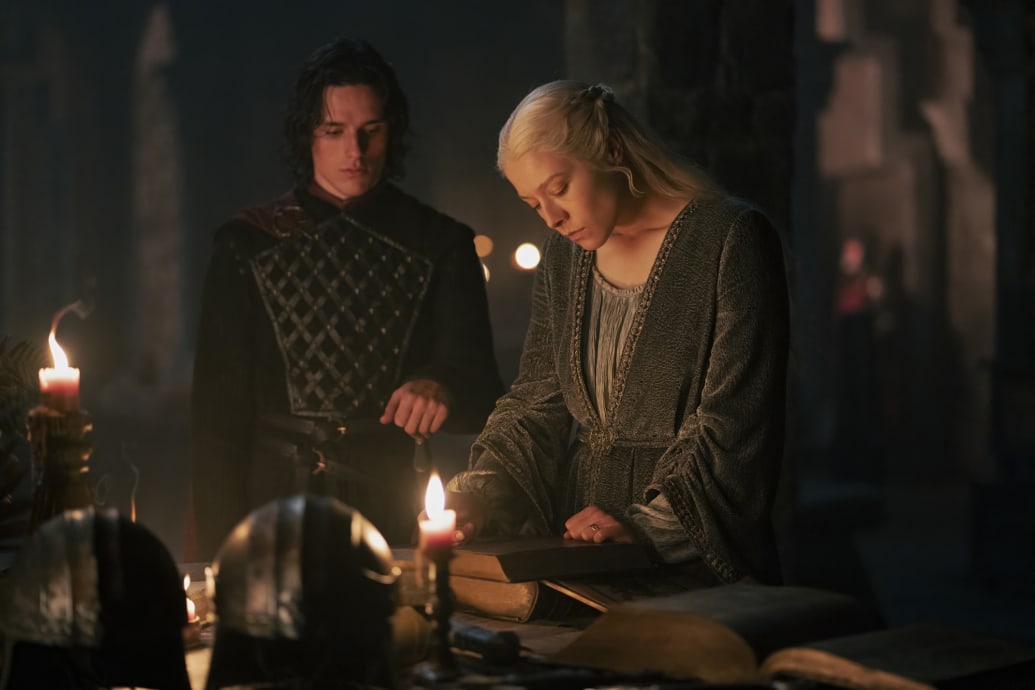
Harry Collett and Emma D’Arcy.
Theo Whiteman/HBO
It should be made clear that HOTD and GOT are two different shows with unique circumstances. However, they exist in the same universe. What happens in the HOTD is a catalyst for what we will eventually see in GOT: the references to Aegon’s prophecy, Targaryen blood, dragons, etc. It is all there.
What is not there, however, is the inclusion of the ‘violent woman’—at least, not until the recent episode when we witness a stark change in Rhaenyra Targaryen (played by Emma D’Arcy), and even that does not solve the show’s lack, and even fear, of violent women. In Season 1 of House of the Dragon, I initially believed steps were being made to portray women in a more violent light and we did see that in some instances.
Alicent Hightower’s (Olivia Cooke) memorable scene at Driftmark, charging at Rhaenyra with a knife for retribution for the loss of her son’s eye was a promising start and illustrated a beautiful image of development from her silent protest at Rhaenyra’s wedding when she entered the scene wearing her green dress, to her time being a mother and queen. She was not afraid to get violent when it came to her son.
This, coupled with Rhaenyra hatching a plan to fake Laenor’s death so that she could eventually marry Daemon (Matt Smith), at the expense of murdering an innocent servant, showed us that when personal desires were at stake, none of these women were afraid to bloody their hands. At the beginning of Season 2, following the confirmation of her son’s death, Rhaenyra made it clear that she wanted Aemond Targaryen dealt with—her son’s killer. This was another push toward showcasing a more violent, vengeful direction for her character at the start of the season.
Despite both women living under patriarchal constraints in all the examples I mentioned above, blood lust was never off the table. They resorted to it, and it strengthened their narratives. Neither Alicent nor Rhaenyra sat back and asked for men’s permission to be violent, they were the artists of their own aggression.
Unfortunately, the majority of Season 2 of HOTD lacks that same fire.
Up until Episode 6, we’ve seen both women constantly sitting amongst their majority-male counselors and being told what they can and cannot do, and while that is a huge problem in itself, the narrative’s need to overly perpetuate this idea that men want violence, whereas women do not, pushes a concerning message. That message is, in times of war women would rather seek the ‘peaceful’ way out, whereas men aren’t afraid to dirty their hands.
Let’s take Alicent and the Green Council. The men around her—notably her sons and Criston Cole (Fabien Frankel)—not only speak over her, but are quick to discuss resorting to offensive measures against the Blacks. This results in the other men in the council also rallying behind them to push violence and a potentially bloody war. What does Alicent do? Well, despite the fact that she is the Dowager Queen, she does little to oppose what they are saying, and when she does, she cautions against violence and rather, pushes for peaceful, less aggressive measures against the Blacks.
In Season 2, Episode 1, Criston Cole (Fabien Frankel) and Aemond share a scene where they discuss aggressive measures against the Blacks, and in this conversation, Alicent is brought up. She is described by Aemond as having “love for the enemy” and by Criston as having a “gentle heart.”
This scene does two things. First, it reinforces how men in the show are more wired for violent war, and second, how Alicent herself is very docile, empathetic, and striving for non-violence. This is reflected in Alicent’s character as the season plays out. We see her opposition toward war, even in the face of the assassination of her grandson. When Aemond dismisses her from the small council and instructs her to return to domestic duties, she accepts it without protest. All the while, Aemond continues to plan the war.
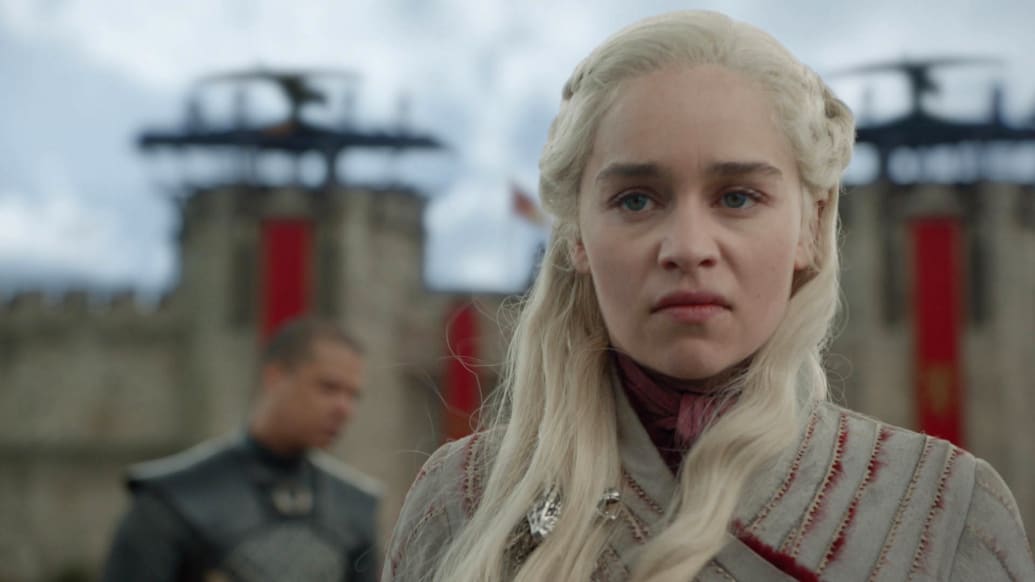
Emilia Clarke
Helen Sloan/HBO
Rhaenyra has more agency than Alicent, but she is not much different.
She is undoubtedly angry at the Greens for usurping her throne yet, she is very much an advocate for non-violence, so much so that as the show has progressed, it has put her in opposition to both her councilors, her uncle and husband, Daemon Targaryen and her son. Like Alicent, there is a theme that persists when it comes to Rhaenyra versus the men in her council; men want war, and she seeks an alternative to violence. This extends Rhaenys as well. In Season 2, Episode 3, Rhaenys counsels Rhaenyra against war and pushes her to speak to Alicent. While Rhaenys does fight at Rook’s Rest, it is clear this is a ‘last option’ situation.
As the show heavily critiques misogyny and the patriarchy, I can understand the picture the writers paint for us. The juxtaposition between men and women on both sides is clear; men charge into battle and push for bloody war. Women do not, they wait and caution men against violence.
However, with the pre-established universe that Game of Thrones has created—it just does not make sense. This push for peace and nonviolence takes so much agency and complexity from the women in House of the Dragon. GOT shows us that women can be diplomatic, calculating, smart, and also violent. This does not diminish their character; It is okay for women to crave violence when their lives are at stake.
Writers can still critique the patriarchy and misogyny while allowing women to seek violence for what they believe in.
Daenerys did not make peace with the Dothraki Khals who captured her. She did not push her claim to the Seven Kingdoms through actions of non-violence. Sansa did not seek peace against Ramsay Bolton when she rallied Jon and the Vale to fight for Winterfell and later fed Bolton to his dogs. This is to say, violence does not take away interesting traits from female characters, nor does it overshadow the fact that they face misogyny. Both Sansa and Daenerys started as vulnerable, terrible girls who found strength in war and violence. The same can be said for Rhaenyra and Alicent.
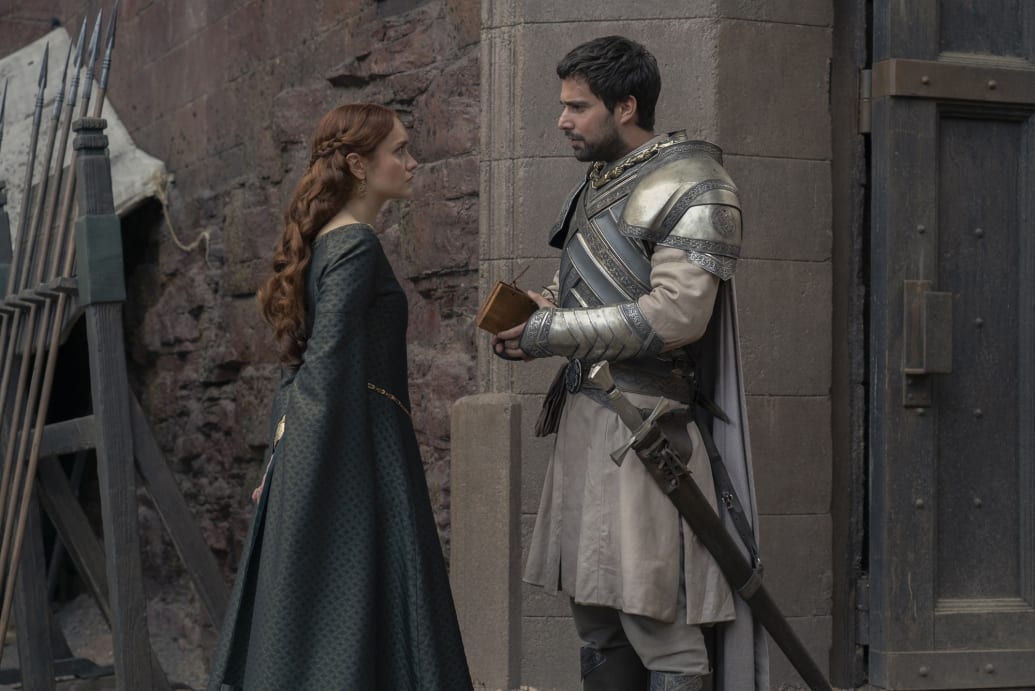
Olivia Cooke and Fabien Frankel
Liam Daniel/HBO
I hope that as HOTD Season 2 concludes, we can see both Alicent and Rhaenyra push more toward violence. In the most recent episode, there is a hint of hope with Rhaenyra’s character, but I feel, this far into the season, it’s concerning.
The episode ends with Rhaenyra leaving Dragonstone with Syrax in search of Addam of Hull who has just claimed SeaSmoke. From what we know, Rhaenyra refuses to sit around any longer. She has made it clear she wants to fight for her birthright.
With two episodes left, I’m curious to see if the fear of HOTD’s violent woman will be rectified, and hope for the best.
